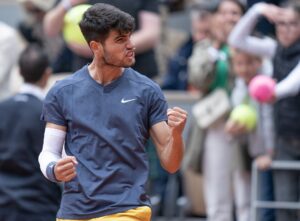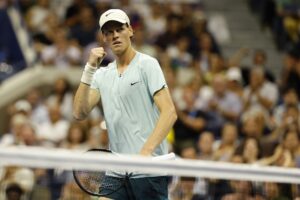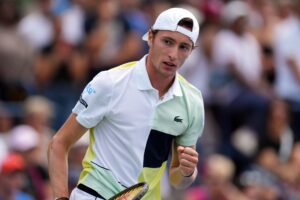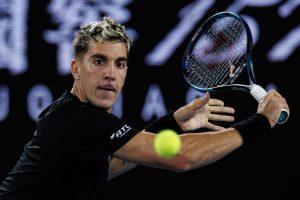Andrey Rublev must hate the sight of Paris. In the last six weeks or so, it is the only place where he has lost on tour, as he followed up his quarterfinal loss to Stefanos Tsitsipas in the French Open with a defeat last night at the Paris Masters to a revitalised Stan Wawrinka. Outdoors or indoors, on clay or on carpet, the Russian has twice floundered in the City of Light.
However, those two defeats should not obscure the remarkable run that he has been on in the autumn of 2020, when he has been the most consistent performer on the ATP Tour and finally shown that he is ready to translate all the outstanding promise he had shown as a junior into genuine adult achievement.
In the first set against Wawrinka, Rublev looked as if he would continue the 11-match and two-tournament winning streak that he had been on since losing at Roland Garros. He won it 6-1 and seemed on course for yet another straight-sets victory. That was until Wawrinka rolled back the years to rediscover the unique combination of power-hitting and finesse that had propelled him to three Major triumphs in the middle of the last decade.
As the Amazon Prime commentators, Mark Petchey and Sam Smith, said admiringly, it was as if Wawrinka had finally found the force of will and potency of shot to pierce the Russian’s excellent defences, and he eventually triumphed in three sets, 1-6, 6-4, 6-3.
Rublev was characteristically angry with himself at the end of the match; like most serial winners, he is not a particularly good loser. However, he should not be too hard on himself, as it is entirely possible that he just ran out of steam against Wawrinka, after putting together a stunning succession of performances either side of the delayed French Open.
Going into that Major, the last of the year, he had already won in Hamburg to demonstrate again the clay-court credentials that many expert observers think will eventually see him triumph at Roland Garros in the Men’s Singles. That was obviously not the case this year, as Stefanos Tsitsipas reversed the result in the Hamburg final by beating the Russian in straight sets in the last eight of the French Open. Nevertheless, Rublev soon regained his pre-Roland Garros form by winning on hard court in St Petersburg, where he beat Borna Ćorić, 7–6 (7–5), 6–4 in the final.
Then he continued his impressive vein of form in Vienna. He beat the defending champion, home favourite and new US Open Champion Dominic Thiem in the quarterfinals, saw Kevin Anderson retire in the semifinals and in the final beat Lorenzo Sonego, the lucky loser who had astonishingly thrashed Novak Djokovic in the last eight, in straight sets. And for good measure, he then completely charmed the Austrian crowd by announcing that winning in Vienna was particularly special for him because one of his grandmothers had hailed from the city.
Both of Rublev’s performances in that final – first with the racket in hand and then with the microphone in hand – further demonstrated that he has really come of age, in every sense, this season, despite the fact that it has been the most disrupted season in the Open era because of the coronavirus pandemic. He had been, of course, an outstanding junior, winning the 2014 French Open Boys Title.
However, a frustrating series of injuries since then had prevented him from immediately capitalising on that impressive end to his junior career. Indeed, it was arguably only at Cincinnati last year, when he defeated Roger Federer in straight sets in a stunning display of power and touch, that he really reminded everyone why he had long been earmarked to become a Major Champion as a man and not just as a boy.
If Cincy 2019 was a relatively isolated highlight in previous years, 2020 has been the year in which Rublev has genuinely attained consistency on tour, and title-winning consistency at that. His three titles this autumn (which go alongside the two he had won previously) have propelled him, first, into the world’s top 10 and then into the ATP Tour Finals, which even without fans should still be a fitting swansong to the season-ending event’s time in London.
The challenge for Rublev now is clear, as it is for every player who begins to win on tour regularly, namely to translate those triumphs in non-Major events into sustained performance and achievement at the Majors themselves. To make that final transition in his career, he will have to improve the two obvious weaknesses in his game, the relatively weak second serve and the relatively poor volleying skills, and turn them into strengths.
Fortunately for Rublev, he shows every sign of knowing his own weaknesses better than anyone else. He is clearly a tennis lover, having admitted since the resumption of the ATP Tour just how much he had missed it earlier in the year, and his admiration of the three tennis Gods who have dominated the men’s side of the sport for the last decade and a half is unbounded.
And if he needed any reminder of the truly astonishing consistency that they have achieved throughout their careers, it came earlier this week at the Paris Masters with Rafael Nadal’s 1,000th tour win, which put the Spaniard in the most exclusive of tennis clubs alongside Jimmy Connors, Roger Federer and Ivan Lendl.
Rublev is still a long, long way from achieving that kind of stellar career. Nevertheless, his superb run of form post-lockdown (or rather post-original lockdown) has surely proved that he will be at the forefront of the contenders to replace Nadal, Federer and Djokovic at the top of the game whenever their remarkable reign finally ends.
For a time this autumn, he has been so imperious that he has effectively looked like a Napoleon in reverse – a Russian who could conquer the whole of Europe. And if ultimately he failed to conquer Paris (twice), there is still every chance of Major success at Roland Garros and perhaps even in the other tennis capitals of the world in the years ahead.
Main photo:
Embed from Getty Images






